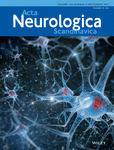Cognitive function in stroke survivors: A 10-year follow-up study
Funding information
This study was supported by Region Skåne, Lund University, the Swedish Heart and Lung Foundation, the Freemasons Lodge of Instruction EOS in Lund, King Gustaf V's and Queen Victoria's Foundation, the Swedish Stroke Association, and the Ribbingska Foundation in Lund, Sweden.
Abstract
Objectives
Post-stroke cognitive impairment (PSCI) has considerable impact on patients and society. However, long-term studies on PSCI are scarce and may be influenced by assessment methods and selection bias. We aimed to (i) assess the prevalence of long-term PSCI; (ii) compare two common cognitive assessment instruments; and (iii) compare cognitive function of long-term stroke survivors with non-stroke persons.
Methods
Mini-Mental State Examination (MMSE) and Montreal Cognitive Assessment (MoCA) were administered to 10-year survivors from a population-based cohort of first-ever stroke patients included in the Lund Stroke Register, Sweden, in 2001-2002. PSCI was defined as MMSE<27 and/or MoCA<25 and severe cognitive impairment as MMSE<23. Age- and sex-matched non-stroke control subjects who had performed MMSE (but not MoCA) were recruited from the longitudinal population study “Good Ageing in Skåne.” The odds of having cognitive impairment for stroke survivors compared to controls were examined with logistic regression analyses adjusting for education.
Results
Of 145 stroke survivors after 10 years, 127 participated. MMSE showed PSCI in 46%, whereas MoCA displayed PSCI in 61%. Among the stroke survivors with MoCA<25, 35% had MMSE≥27 (P<.001). The odds of having severe cognitive impairment defined as MMSE<23 were higher among the stroke survivors compared to 354 controls (education-adjusted; OR=2.5; P=.004).
Conclusions
Post-stroke cognitive impairment was prevalent among 10-year stroke survivors, and the odds of having severe cognitive impairment were higher among the stroke survivors compared to non-stroke persons. The burden of long-term PSCI might have been underestimated previously, and MoCA may be more suitable than MMSE to detect long-term PSCI.




